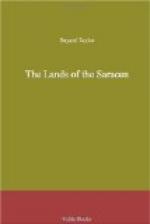But when I climbed the last ridge, and looked ahead with a sort of painful suspense, Jerusalem did not appear. We were two thousand feet above the Mediterranean, whose blue we could dimly see far to the west, through notches in the chain of hills. To the north, the mountains were gray, desolate, and awful. Not a shrub or a tree relieved their frightful barrenness. An upland tract, covered with white volcanic rock, lay before us. We met peasants with asses, who looked (to my eyes) as if they had just left Jerusalem. Still forward we urged our horses, and reached a ruined garden, surrounded with hedges of cactus, over which I saw domes and walls in the distance. I drew a long breath and looked at Francois. He was jogging along without turning his head; he could not have been so indifferent if that was really the city. Presently, we reached another slight rise in the rocky plain. He began to urge his panting horse, and at the same instant we both lashed the spirit into ours, dashed on at a break-neck gallop, round the corner of an old wall on the top of the hill, and lo! the Holy City! Our Greek jerked both pistols from his holsters, and fired them into the air, as we reined up on the steep.
From the descriptions of travellers, I had expected to see in Jerusalem an ordinary modern Turkish town; but that before me, with its walls, fortresses, and domes, was it not still the City of David? I saw the Jerusalem of the New Testament, as I had imagined it. Long lines of walls crowned with a notched parapet and strengthened by towers; a few domes and spires above them; clusters of cypress here and there; this was all that was visible of the city. On either side the hill sloped down to the two deep valleys over which it hangs. On the east, the Mount of Olives, crowned with a chapel and mosque, rose high and steep, but in front, the eye passed directly over the city, to rest far away upon the lofty mountains of Moab, beyond the Dead Sea. The scene was grand in its simplicity. The prominent colors were the purple of those distant mountains, and the hoary gray of the nearer hills. The walls were of the dull yellow of weather-stained marble, and the only trees, the dark cypress and moonlit olive. Now, indeed, for one brief moment, I knew that I was in Palestine; that I saw Mount Olivet and Mount Zion; and—I know not how it was—my sight grew weak, and all objects trembled and wavered in a watery film. Since we arrived, I have looked down upon the city from the Mount of Olives, and up to it from the Valley of Jehosaphat; but I cannot restore the illusion of that first view.
We allowed our horses to walk slowly down the remaining half-mile to the Jaffa gate. An Englishman, with a red silk shawl over his head, was sketching the city, while an Arab held an umbrella over him. Inside the gate we stumbled upon an Italian shop with an Italian sign, and after threading a number of intricate passages under dark archways, and being turned off from one hotel, which was full of travellers, reached another, kept by a converted German Jew, where we found Dr. Robinson and Dr. Ely Smith, who both arrived yesterday. It sounds strange to talk of a hotel in Jerusalem, but the world is progressing, and there are already three. I leave to-morrow for Jericho, the Jordan, and the Dead Sea, and shall have more to say of Jerusalem on my return.




